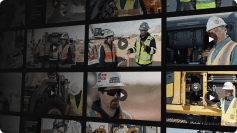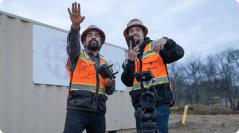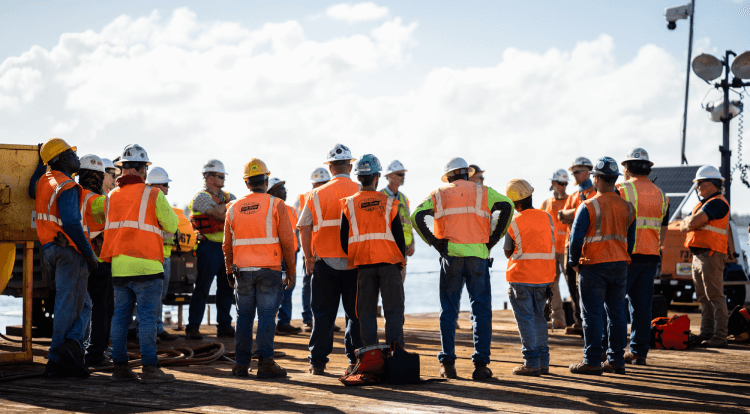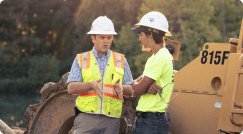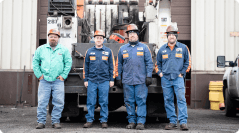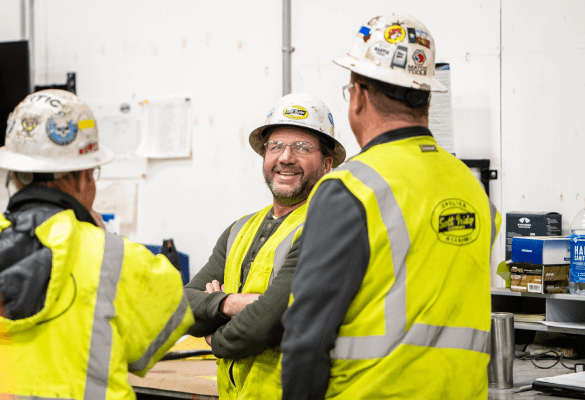Contractors and Geotechnical Engineering
Written by Mike Smith
January 26, 2023
Mike Smith and Randy Blount have worked together for years. Mike's geotechnical engineering firm (SAECO) has helped Randy's construction company (Blount Contracting) on countless jobsites.
They sat down to talk about how contractors and geotechnical engineers can build good working relationships that help both companies win. Here's what they had to say.
Why do contractors and geotechnical engineers need to work together?
According to Mike, geotechnical engineers play a critical role in construction. "Sometimes, we run into problems with the design, the contract, the schedule, and what we find underground. The job is almost dead in the water, but there's often a technical solution," he explained.
A geotechnical engineer can help find that solution to get the job moving again. They may also help the project owner and contractor find ways to save money as they work through pricing the job.
Like Mike said, "When the earth starts getting moved, we find things underground that we weren't expecting to find there. Worst case, they can end up in litigation."But in the best case, with the right people on the project, unearthing surprises creates an opportunity to solve the problem and build the project.
"In construction, every problem is an opportunity," Randy agreed.
What should the relationship between contractors and geotechnical engineers look like?
First and foremost, contractors and geotechnical engineers are on the same team. When you work together to solve problems, you both look good in the project owner's eyes. Plus, you'll find a solution quicker when you try to understand and learn from each other.
The project, the contractor, and the geotechnical firm suffer if you act like the other person keeps you from doing your job. Randy explained, "I've almost never seen that be successful. The way to be successful is to say, 'Alright, we have a problem. How do we come together? How do we understand the problem?'"
Don't just assume the other person is testing wrong or building wrong. Assume they know something you don't, and ask questions to find out what it is.
What if you don't get to choose the geotechnical firm?
When you take on a new project as a contractor, you'll want to find out if you can hire your own geotechnical testing company or if the project owner already has somebody lined up. You may feel stuck if the project owner has made a choice without you, but it doesn't have to be a bad thing.
Treat the company they chose the same as you would treat a company you chose: like you're all on the same team because you are.
What if there are multiple geotechnical firms on the project?
Sometimes, contractors have to work with two geotechnical firms. The project owner may bring in one firm to do quality assurance during the design phase, plus another firm that does quality control during and after construction.
The biggest challenge is when both firms get different test results. Sometimes, that happens because they're doing other tests. Sometimes, they both use federally standardized tests, but each firm takes a slightly different approach to meet those standards. So one firm gets passing results, and one gets failing results on the same test.
Getting two different sets of results can lead to conflicts and literally shut a project down. Some project owners make it the contractor's responsibility to get the geotechnical firms' numbers to line up.
But the best thing to do is get both firms in a room together and figure out why their test results are different. That's an excellent opportunity to build good working relationships. Remember to be open-minded and share ideas.
What are the benefits of relationships between contractors and geotechnical firms?
When contractors and geotechnical firms build relationships, both companies get better results. Here are some of the benefits of these relationships.
You'll have someone to help you understand soil reports and give advice
Randy is a contractor. When his team estimates the costs for an upcoming project, they sometimes call Mike's team for help understanding soil reports—even if the reports are from another company.
According to Mike, some geotechnical firms don't like to give free consultations. They feel like they have to charge for everything they do. Contractors are the same; some are all about the bid and the job. But for Mike and Randy, it's all about relationships.
"Ultimately, whatever you do for people is going to come back to you in some way. When you're trying to build a practice like we are, we have to participate and help contractors out,†Mike said. If he can be of service to somebody who's going to appreciate it, he and his team will do everything they can to help.
The contractor now has someone they can reach out to for help when they run into a soil problem onsite. And geotechnical firms will win more work by being helpful and building relationships than just focusing on the job.
The contractor can tell the project owner, "Hey, we have a relationship with this geotechnical firm. These guys have been good to us. Maybe they're not the lowest bid on this job, but we know we can trust them." You can't buy that kind of advertising.
You can have candid conversations, especially about pricing
Good relationships let you have honest conversations, especially regarding money. It seems like someone is consistently estimating testing prices based on the bare minimum or a perfect project site, which is rare. Somebody else always prices every test, even if the project doesn't need them.
Contractors can get geotechnical testing estimates ranging from $10,000 to $100,000. Talk about confusing! It's tempting to go with the low bid, but that might not be the best.
When you have a good relationship, the contractor can call up the geotechnical firm and say, "Hey, I'm getting estimates that are all over the board. You're kind of in the middle. How are you pricing this?" That helps you plan for upcoming costs, so you don't run out of money and cannot afford quality control testing at the end of the project.
The geotechnical firm can be more honest, too. Some firms are afraid of losing a client to a cheaper company—but really, the more affordable company isn't doing enough testing. Or sometimes, Mike knows a project will take longer than the contractor thinks it will. He knows the price he gives the project owner will change because the contractor's estimate is off.
Without a relationship, the geotechnical engineer can't tell the estimator that the project will take longer. But with a relationship, you can say, "In our experience, this type of project takes longer. Is there something we don't know? Do you guys have a different approach?" That opens the door to learning how the contractor does things and making suggestions.
The project will go smoother
As Randy likes to say, "Partnership is key."
Without relationships, you're working in a vacuum. You likely won't understand the project as well as you could, or the cost estimates will be off. The general contractor might not have enough money to pay for the geotechnical firm's services.
With a strong partnership, your cost estimates will be more accurate, you'll know more about the project, and when you come across problems, you'll have someone to help you solve them.
You'll both get better at your jobs
Geotechnical testing on a project might be as little as 0.5% of the construction budget. Yet project owners and contractors often have an attitude like, "Hey, did anybody remember to hire a testing company?"That's crazy.
Geotechnical testing is a small part of the job, but it can kill the project if it's not done. That's a massive impact on the contractor's production and profitability.
Mike said, "The best contractors that I've worked with know what everybody on their jobsite is doing. They know what their role is because it makes you a better general contractor. If you know what the testing company is coming out there to do, and you can be part of it and be knowledgeable about it, it makes you better at your job."
Likewise, geotechnical engineers get better at their jobs when they ask the project designer and the contractor questions. The more they understand what's being built, the better recommendations they can give the contractor to make sure that the structure lasts.
How do you develop relationships between geotechnical engineers and contractors?
Contractors often worry about client relationships, but relationships with vendors and trade partners are just as valuable. If you're moving dirt, you should regularly foster a relationship with one or two geotechnical firms in your area. You may even need more geotechnical partners if you work in multiple areas since not all testing labs have multi-state offices.
It takes years to build relationships with people where you can have honest conversations and be as beneficial to them as they are to your business. But it's worth the effort.
"Ultimately, this relationship lets you have someone in your market," Randy said. "Find a partner and foster that relationship, and both companies will be better for it."
One of the best ways to find the right geotechnical engineering firm to partner with is to learn about best practices in that field. After all, it's much easier to spot someone you want to work with when you know what to look for.


